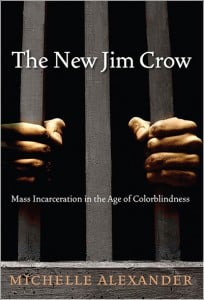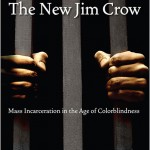As I wrote three weeks ago, I’m running a book group through my church, Valley and Mountain, to read The New Jim Crow: Mass Incarceration in the Age of Colorblindness by Michelle Alexander. (Find all the posts for this book group here. Feel free to use this guide in your church/community!)  Chapter four (“The Cruel Hand,” from a speech by Frederick Douglass) talks about the pervasiveness of the stigma attached to felons and criminals. In addition to preventing former prisoners from obtaining jobs, housing, and other public assistance, the prison label also divides families and communities–one reason that mass incarceration continues to happen under our noses.
Chapter four (“The Cruel Hand,” from a speech by Frederick Douglass) talks about the pervasiveness of the stigma attached to felons and criminals. In addition to preventing former prisoners from obtaining jobs, housing, and other public assistance, the prison label also divides families and communities–one reason that mass incarceration continues to happen under our noses.
How the meetings run:
A quick recap:
Each meeting, we’ll start with a welcome. Then, we’ll have a brief moment of silence. Next, we’ll take turns reading a short text (a Bible verse, poem, quote, or short reading) that somehow reflects our spirituality. Then I’ll read a relevant Bible passage or spiritual reading (for example, by a thinker like Cornel West) and share a short reflection on the text. We’ll discuss the discussion questions for the week, which I’ve pulled from various sources online. To close, we’ll have a prayer circle.
Week 4:
Intro
Our usual moment of silence, followed by sharing our spiritual texts.
Reflection
Next, we’ll read a short spiritual text. Again, c/o John Helmiere, pastor at Valley and Mountain, here are a few quotes from Howard Thurman, an African-American theologian and author. These come from his book Jesus and the Disinherited.
The doom of the children is the greatest tragedy of the disinherited. They are robbed of much of the careless rapture and spontaneous joy of being merely alive… If…the elders understand in their own experiences and lives the tremendous insight of Jesus, it is possible for them to share their enthusiasm with their children. This is the qualitative overtone springing from the depths of religious insight, and it is contagious. It will put into the hands of the child the key for unlocking his hopes.
Another passage that could be read and discussed would be the story of Cain, Genesis 4: 1-16. Alexander compares to the stigma of racism to the mark of Cain.
Adam made love to his wife Eve, and she became pregnant and gave birth to Cain. She said, “With the help of the Lord I have brought forth a man.” Later she gave birth to his brother Abel. Now Abel kept flocks, and Cain worked the soil. In the course of time Cain brought some of the fruits of the soil as an offering to the Lord. And Abel also brought an offering—fat portions from some of the firstborn of his flock. The Lord looked with favor on Abel and his offering, but on Cain and his offering he did not look with favor. So Cain was very angry, and his face was downcast. Then the Lord said to Cain, “Why are you angry? Why is your face downcast? If you do what is right, will you not be accepted? But if you do not do what is right, sin is crouching at your door; it desires to have you, but you must rule over it.” Now Cain said to his brother Abel, “Let’s go out to the field.” While they were in the field, Cain attacked his brother Abel and killed him. Then the Lord said to Cain, “Where is your brother Abel?” “I don’t know,” he replied. “Am I my brother’s keeper?” The Lord said, “What have you done? Listen! Your brother’s blood cries out to me from the ground. Now you are under a curse and driven from the ground, which opened its mouth to receive your brother’s blood from your hand. When you work the ground, it will no longer yield its crops for you. You will be a restless wanderer on the earth.” Cain said to the Lord, “My punishment is more than I can bear. Today you are driving me from the land, and I will be hidden from your presence; I will be a restless wanderer on the earth, and whoever finds me will kill me.” But the Lord said to him, “Not so; anyone who kills Cain will suffer vengeance seven times over.” Then the Lord put a mark on Cain so that no one who found him would kill him. So Cain went out from the Lord’s presence and lived in the land of Nod, east of Eden.
Discussion Questions
I am using the questions from The New Jim Crow Study Guide, which you can download for free here. In addition, I asked: 1. What are your reactions to this week’s text? 2. What actions could we start to take, now that we know what is going on?
Your turn
Have you read this book? Would you like to? Join in by sharing your progress in the comments–I’ll keep updating how the group goes on here, and you can learn from my mistakes : )










